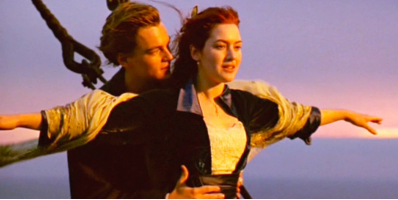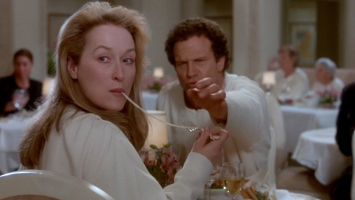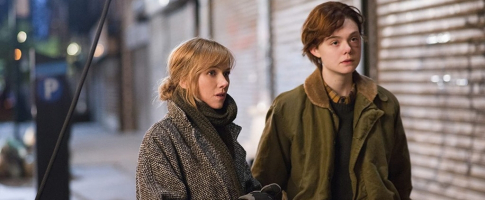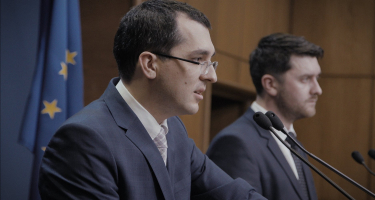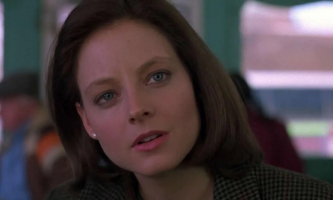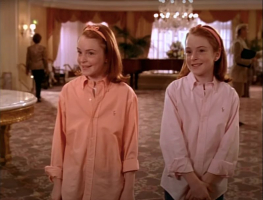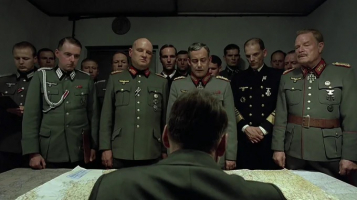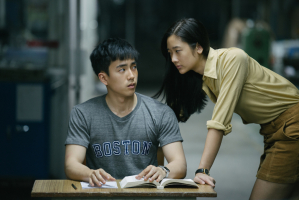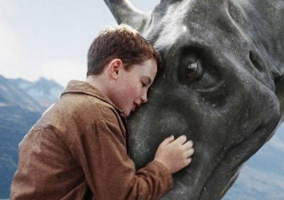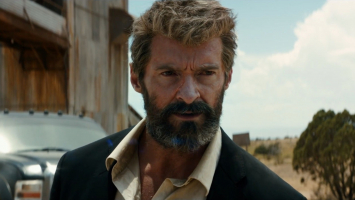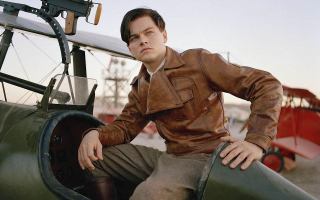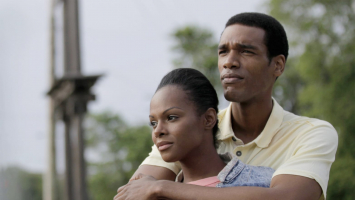Top 10 Best Movies About The Berlin Wall
The Berlin Wall, a towering structure that once divided a city and a nation, continues to captivate the world with its historical significance. Join us on a ... read more...cinematic journey through this list of the best movies about the Berlin Wall.
-
"Wings of Desire" (1987) is an ethereal and thought-provoking film that delicately weaves together the celestial and mortal realms. The narrative centers around two angelic beings who roam the streets of Berlin and the Berlin Wall, silently observing the inner thoughts and emotions of its inhabitants. Through their encounters, the film explores the depths of human longing, the complexities of love, and the profound search for meaning in a world marked by detachment and disconnection.
"Wings of Desire" is a visual feast that captures the essence of Berlin with stunning artistry. Wenders' mastery is evident in the use of black-and-white cinematography, which imbues the film with a timeless quality and accentuates the contrasting textures of the cityscape. The camera moves with grace and fluidity, allowing viewers to glide effortlessly between the angelic and human perspectives.
Beyond its aesthetic allure, "Wings of Desire" delves into the profound existential questions that haunt the human experience. It contemplates the yearning for connection and the fragile nature of our mortal existence, reflecting on the consequences of living in an increasingly isolated and technology-driven society, where genuine human interactions are often overshadowed by superficial distractions. The movie urges us to peel back the layers of routine and apathy, inviting us to engage with the world with empathy and curiosity.
As one of the best movies about the Berlin Wall, "Wings of Desire" invites viewers to embark on a deeply introspective journey, serving as a poignant reminder of the transformative power of compassion, connection, and love in a world that often feels distant and fragmented. Through its lyrical storytelling and breathtaking cinematography, it urges to embrace the extraordinary beauty that resides within the ordinary moments of life.
Release: 1987
Stars: Bruno Ganz, Solveig Dommartin, Otto Sander
Rotten Tomatoes Score: 97%
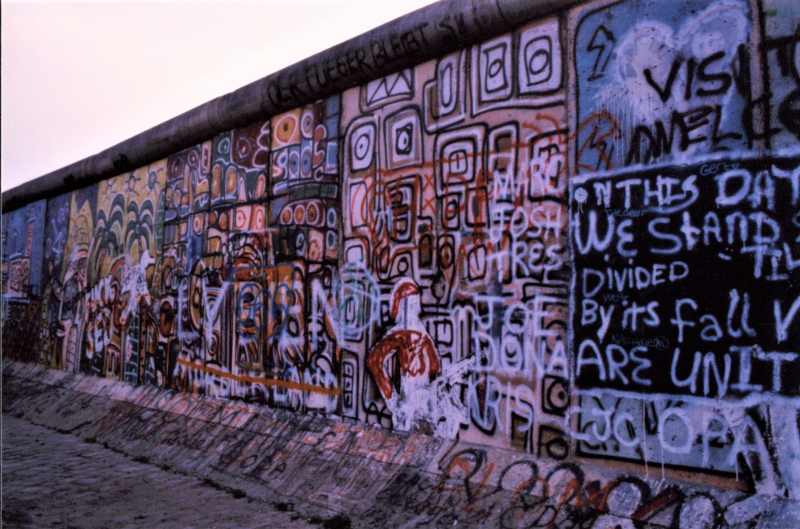
Photo on Wiki: https://commons.wikimedia.org/wiki/File:Berlin_Wall_graffiti_1986.jpg HD Retro Trailers -
"The Lives of Others" (2006) in set in 1980s around the Berlin Wall, intricately weaveing the lives of a playwright and his lover with the relentless observation of a Stasi agent, leading to a complex web of emotions and a profound transformation of all involved. Through its compelling and multi-layered narrative, the film explores profound themes of morality, personal freedom, and the resilience of the human soul.
Cinematographically, "The Lives of Others" presents a stark and atmospheric portrayal of life under the oppressive gaze of the Stasi. The carefully curated muted color palette and masterful use of shadows artfully convey the suffocating atmosphere of East Berlin, plunging viewers into a world characterized by ceaseless surveillance and unrelenting fear. Furthermore, the movie's cinematography becomes a language in itself, capturing the subtlest nuances of human expression, offering glimpses into the characters' profound emotions and inner struggles.
Engrossing plot and visually arresting aesthetics aside, "The Lives of Others" imparts a profound message about the transformative power of compassion and the potential for personal growth even in the most dire circumstances. It skillfully navigates the moral quandary faced by the Stasi agent as he becomes increasingly entangled in the lives of his subjects, ultimately grappling with questions of conscience and the true nature of humanity.
The film stands as one of the best movies about the Berlin Wall, delving deep into the complexities of human nature and offering a profound exploration of personal freedom, morality, and the capacity for profound change.
Release: 2006
Stars: Ulrich Mühe, Martina Gedeck, Sebastian Koch
Rotten Tomatoes Score: 92%
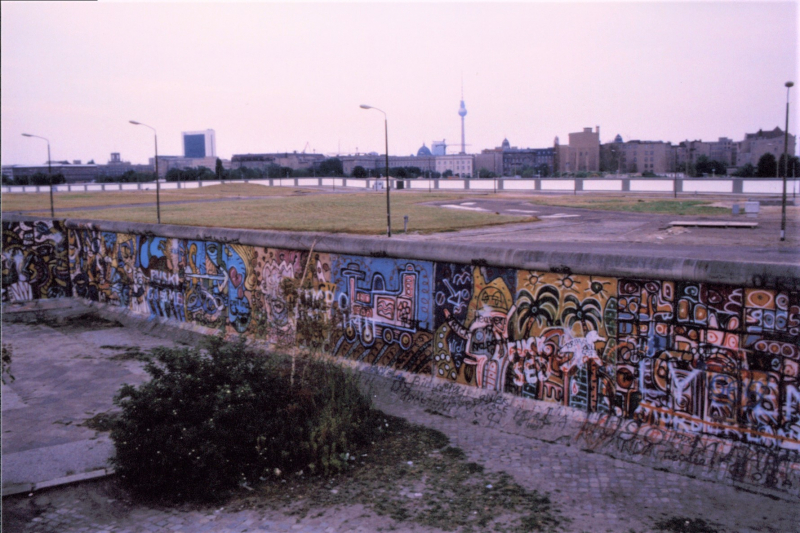
Photo on Wiki: https://commons.wikimedia.org/wiki/File:Berlin_Wall_in_1986_looking_toward_East_Germany.jpg Sony Picture Classics -
"Hedwig and the Angry Inch" (2001) is a musical film that tells the story of Hedwig, a genderqueer rock musician from the Berlin Wall. The plot follows Hedwig's journey of self-discovery, love, and identity after a botched gender reassignment surgery.
The movie dazzles with its flamboyant and theatrical visual style, whose vibrant color palette and inventive camera movements mirror the energy and emotional intensity of Hedwig's musical performances. Its cinematography seamlessly transitions between dreamlike sequences and gritty reality, capturing the duality of Hedwig's experiences and the contrast between her inner world and the external constraints of society. On another note, the creative use of lighting and costume design further enhance the film's unique visual language, adding depth and richness to the storytelling.
"Hedwig and the Angry Inch" is not just all about engaging stories and visually striking aesthetics; it also carries a profound message about the complexities of identity and the universal quest for self-acceptance. The film delves into the challenges faced by individuals who defy societal norms, offering a poignant exploration of the transformative power that comes with embracing one's authentic self. By doing so, it celebrates the resilience of the human spirit while emphasizing the importance of personal liberation and the search for love and connection in unexpected places.Release: 2001
Stars: John Cameron Mitchell, Miriam Shor, Stephen Trask
Rotten Tomatoes Score: 92%

Photo on Flickr: https://www.flickr.com/photos/portlandcenterstage/49324344902 Rotten Tomatoes Classic Trailers -
"Bridge of Spies" (2015), directed by Steven Spielberg, is a gripping Cold War drama based on true events. The film revolves around an American lawyer who is tasked with negotiating the exchange of a captured Soviet spy for an American U-2 pilot held captive in East Germany during the height of the Berlin Wall. Amid political tensions and divided ideologies, the lawyer finds himself navigating treacherous waters to ensure the safe return of both men and prevent an escalation of the conflict.
From a cinematographic standpoint, "Bridge of Spies" showcases an awe-inspiring visual tapestry that deftly captures the gritty realities of Cold War-era Berlin and the stark disparities between the Eastern and Western realms. Employing a masterful interplay of meticulously framed shots and evocative lighting techniques, the cinematography conveys the palpable tension and all-pervasive paranoia that permeated the era. The skillful use of visual symbolism and thoughtful framing imbues pivotal moments with heightened emotional resonance, plunging the audience deep into the moral quandaries faced by the film's protagonists.
Beneath its enthralling narrative and visual splendor, "Bridge of Spies" imparts a profound and timeless message concerning the fundamental significance of human rights, empathy, and the unrelenting quest for justice. The film unravels the intricate power dynamics and ethical dilemmas that underpin the realm of international diplomacy, casting an unyielding spotlight on the arduous sacrifices borne by individuals in service to larger geopolitical interests. By raising profound questions surrounding the nebulous boundaries between heroism and pragmatism, the film compels viewers to confront the complexities inherent in navigating a world consumed by conflicting ideologies.
Release: 2015Stars: Tom Hanks, Mark Rylance, Alan Alda
Rotten Tomatoes Score: 91%
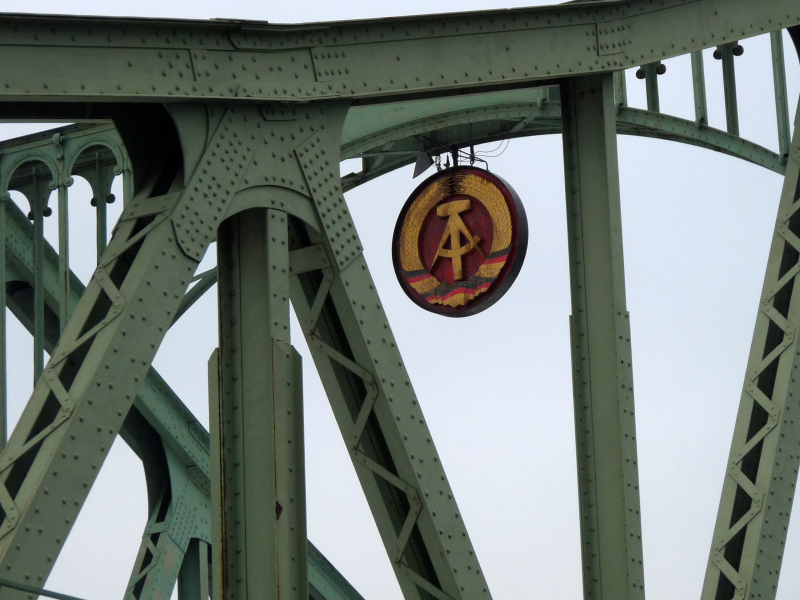
Photo on Wiki: https://commons.wikimedia.org/wiki/File:Glienicker_Br%C3%BCcke_Film_%284%29.JPG Rotten Tomatoes Trailers -
"Goodbye Lenin!" (2003) is a heartwarming and comedic film set after the fall of the Berlin Wall. It is about a young man named Alex as he goes to great lengths to shield his mother - who has just awakened from a coma - from the reality of the political and social changes occurring in East Germany.
"Goodbye Lenin!" displays a meticulous attention to detail in capturing the contrasting worlds of East and West Germany. The film expertly employs color grading and visual composition to vividly portray the stark differences between the drab and austere atmosphere of the former East and the vibrant and consumer-driven society of the West. Its visual effortlessly transitions between intimate close-ups and sweeping wide shots, enabling viewers to intimately experience the emotional journey of the characters while simultaneously providing a broader context of the historical transformation unfolding.
Through these striking aesthetics, "Goodbye Lenin!" carries a profound message about the power of memory, the indomitable resilience of the human spirit, and the significance of preserving personal history. The movie examines the intricacies of nostalgia, illustrating how it can both offer solace and confine individuals, and how it molds their perception of the present. From there, the story incites viewers to reflect on the notion of collective identity and the profound impact of political changes on individual lives, underscoring the universal yearning for stability and connection amidst times of upheaval.Release: 2003
Stars: Daniel Brühl, Katrin Sass, Chulpan Khamatova
Rotten Tomatoes: 90%
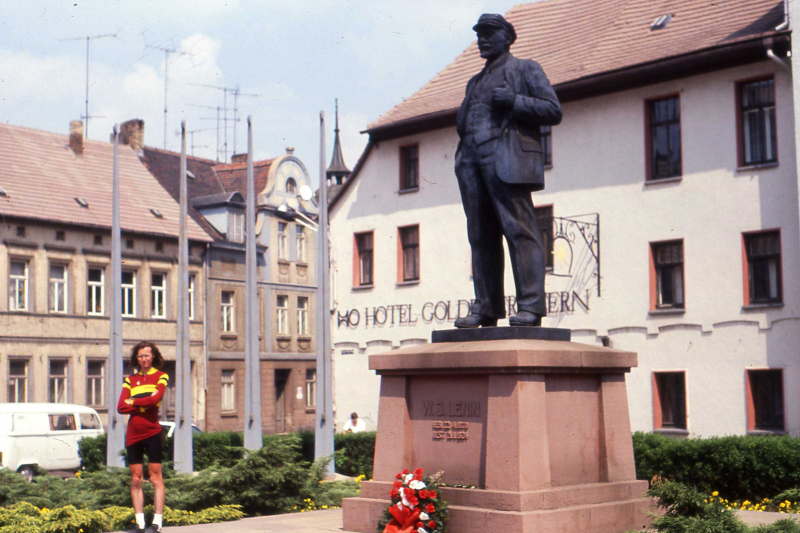
Photo on Wiki: https://commons.wikimedia.org/wiki/File:Goodbye_Lenin,_HO_Hotel_Goldener_Stern,_Lutherstadt_Eisleben,DDR,_May_1990_%283422227948%29.jpg Movie Recommendations -
"The Spy Who Came in from the Cold" (1965), directed by Martin Ritt, is a gripping espionage thriller set during the height of the Cold War and the era of the Berlin Wall. It revolves around Alec Leamas, a British intelligence officer who embarks on a perilous mission to undermine an East German spy network. As the lines between loyalty and betrayal blur, Leamas finds himself caught in a web of deception and moral ambiguity, ultimately questioning the nature of his own role in the shadowy world of espionage.
The cinematography of "The Spy Who Came in from the Cold" skillfully captures the harsh realities and palpable tension of the Cold War era. Its use of stark black-and-white visuals creates a visually striking atmosphere, accentuating the moral complexities and shadowy nature of espionage. On the same note, the contrast between the austere, oppressive world of the East and the comparatively brighter and more open society of the West becomes a visual metaphor for the ideological divide and the human cost of the political conflict.
Beneath its gripping plot, "The Spy Who Came in from the Cold" digs into profound themes of disillusionment, sacrifice, and the personal cost of serving national interests. It raises profound questions about the nature of loyalty and the toll it takes on individuals caught in the web of international intrigue.
In conclusion, "The Spy Who Came in From the Cold" is an exemplar of tension and psychological intrigue, embodying the finest elements of the espionage genre. The movie's gripping plot, atmospheric cinematography, and exploration of moral ambiguity distinguish it as a timeless classic that continues to captivate audiences.
Release: 1965Stars: Richard Burton, Oskar Werner, Claire Bloom
Rotten Tomatoes Score: 89%
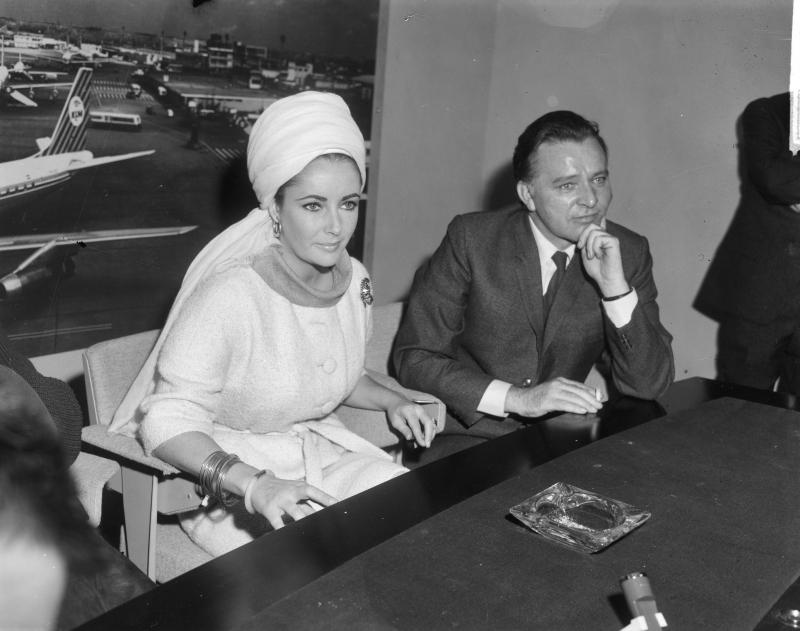
Photo on Wiki: https://commons.wikimedia.org/wiki/File:Liz_Taylor_en_Richard_Burton_tijdens_persconferentie_op_Schiphol_betreft_film_,_Bestanddeelnr_917-6939.jpg HD Retro Trailers -
Directed by David Leitch, "Atomic Blonde" (2017) is a high-octane action thriller set in the backdrop of the Cold War and the imminent fall of the Berlin Wall. The plot follows MI6 agent Lorraine Broughton, portrayed by Charlize Theron, who is dispatched to Berlin to recover a highly sensitive dossier that could expose a double agent within the intelligence community. As Broughton navigates a dangerous web of deception, she encounters ruthless adversaries and must rely on her exceptional skills and instincts to accomplish her mission.
In the heart of a divided Berlin, the film immerses viewers in a visually stunning and gritty atmosphere. The cinematography captures the essence of the time period with its vibrant neon lights, contrasting against the austere and war-torn backdrop of the city. Better yet, its action sequences are meticulously choreographed and shot, showcasing the raw intensity and physicality of Broughton's character. Viewers are also impressed with its expert employment of long takes and quick cuts to create a sense of urgency and bekcons the audience off their seats.
With its adrenaline-fueled plot, "Atomic Blonde" highlights the themes of espionage, betrayal, and survival. The film explores the moral complexities faced by spies in a world where trust is a luxury and alliances can shift in an instant, questioning the blurred lines between heroism and self-preservation. Through Broughton's character, the film also offers a powerful depiction of a strong, independent female protagonist who defies gender stereotypes and fights on equal footing with her male counterparts.
Release: 2017
Stars: Charlize Theron, James McAvoy, John Goodman
Rotten Tomatoes Score: 79%

Photo on Pixabay: https://pixabay.com/photos/fashion-blond-portrait-young-woman-3147497/ Zero Media -
"Buffalo Soldiers" (2001) is a darkly comedic Berlin Wall drama revolving around Ray Elwood. An American soldier stationed in West Germany, Elwood finds himself entangled in a web of corruption, black market dealings, and criminal activities within the military base. As the Berlin Wall teeters on the brink of collapse, Elwood's illicit schemes become increasingly perilous, leading to a series of dangerous and morally ambiguous choices.
In the midst of a divided Berlin, the film captures the gritty and surreal atmosphere of the time period. The cinematography portrays the stark contrasts between the strict military discipline and the seedy underbelly of the base. The visuals effectively convey the tension and uncertainty of the era, juxtaposing the mundane routines of military life with the escalating chaos surrounding the fall of the Berlin Wall.Against the backdrop of this atmospheric aesthetic, "Buffalo Soldiers" examines themes of corruption, disillusionment,and the destructive nature of power - and, from there, slowly revealing consequences of an unchecked military industrial complex during times of political transition. It offers a scathing critique of the destructive impact of American imperialism and the dehumanizing effects of war, demonstrating how individuals can be swept up in a system that values personal gain over principles.
Release: 2001
Stars: Joaquin Phoenix, Anna Paquin, Ed Harris
Rotten Tomatoes Score: 73%
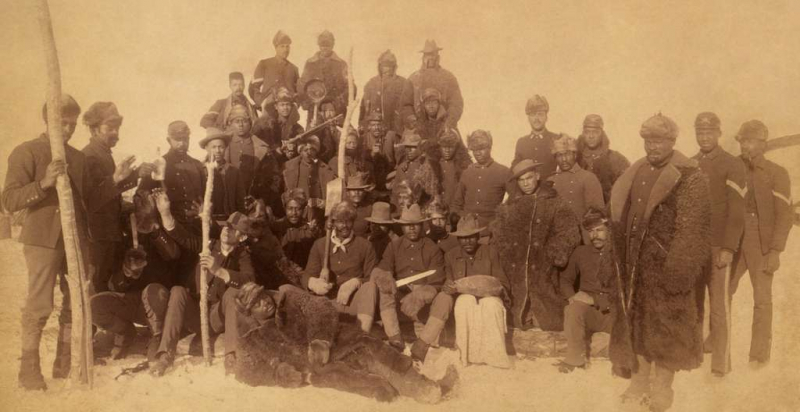
Photon on jenikirbyhistory: https://jenikirbyhistory.getarchive.net/media/buffalo-soldiers1-86d4b6 Madman Films -
Set in East Berlin in 1961, shortly after the construction of the Berlin Wall, "The Promise" follows the story of Konrad and Sophie, who plan a daring escape to Western Germany with their friends. While their friends succeed, Konrad remains behind. Over the next 28 years, Konrad, now an esteemed Astrophysicist, and Sophie strive to reunite despite the Iron Curtain. Konrad seizes opportunities at scientific congresses outside of Eastern Germany to orchestrate encounters with Sophie. However, their pursuit is hindered by the watchful eyes of the Stasi, the political police, who monitor their every move along with Konrad's sister Barbara and her husband Harald.
The film skillfully navigates the complex dynamics of love and betrayal against the backdrop of a divided city. Cinematographically, von Trotta employs a captivating visual style that captures the essence of Berlin during this pivotal time. The contrasting imagery between the bustling streets and the desolate landscapes reflects the stark division between East and West, heightening the tension and uncertainty felt by the characters.
At its core, "The Promise" revolves around depths of human emotions and the consequences of political ideologies. Through Sophie and Konrad's personal and professional challenges, the film examines the intricate web of relationships shaped by conflicting beliefs and personal motivations. It prompts viewers to question their own values and empathize with the characters as they navigate the complexities of their choices.
On another note, "The Promise" also offers a profound meditation on the nature of activism and personal responsibility, challenging conventional notions of heroism and highlights the sacrifices made in the pursuit of justice and truth. As the characters grapple with their own convictions and confront the compromises they must make, the film encourages introspection and contemplation about the challenges of living in a morally ambiguous world.
Release: 1995Stars: Corinna Harfouch, Meret Becker, August Zirner
Rotten Tomatoes Score: 71%

Photo on HDWallpaper: https://www.wallpaperflare.com/berlin-berlin-wall-graffiti-germany-mural-communism-travel-wallpaper-epfcr Alleskino -
"Funeral in Berlin" (1966) follows British intelligence agent Harry Palmer as he is tasked with navigating the complex and dangerous world of Cold War Berlin. Palmer is assigned to facilitate the defection of a high-ranking Soviet intelligence officer, but soon finds himself entangled in a web of deceit, double-crossing, and political intrigue. As he works to uncover the truth and outmaneuver his adversaries, Palmer must confront his own morality and the harsh realities of the divided city.
With its gritty and atmospheric cinematography, "Funeral in Berlin" captures the bleakness and tension of Cold War-era Berlin. Through its evocative camerawork and use of shadows, the cinematography effectively creates a sense of paranoia and claustrophobia, immersing viewers in the dangerous world of espionage.
Beyond its thrilling plot, "Funeral in Berlin" is also a cinematic message about betrayal, identity, and the blurred lines between loyalty and self-preservation. The film delves into the moral complexities faced by intelligence agents, raising questions about the personal sacrifices made in the pursuit of national security. It sheds light on the human cost of the ideological conflict of the time, and the toll it takes on both individuals and society.
Release: 1966Stars: Michael Caine, Oscar Homolka, Paul Hubschmid
Rotten Tomatoes Score: 67%
British Classic Film Clips Moviestrailers03












